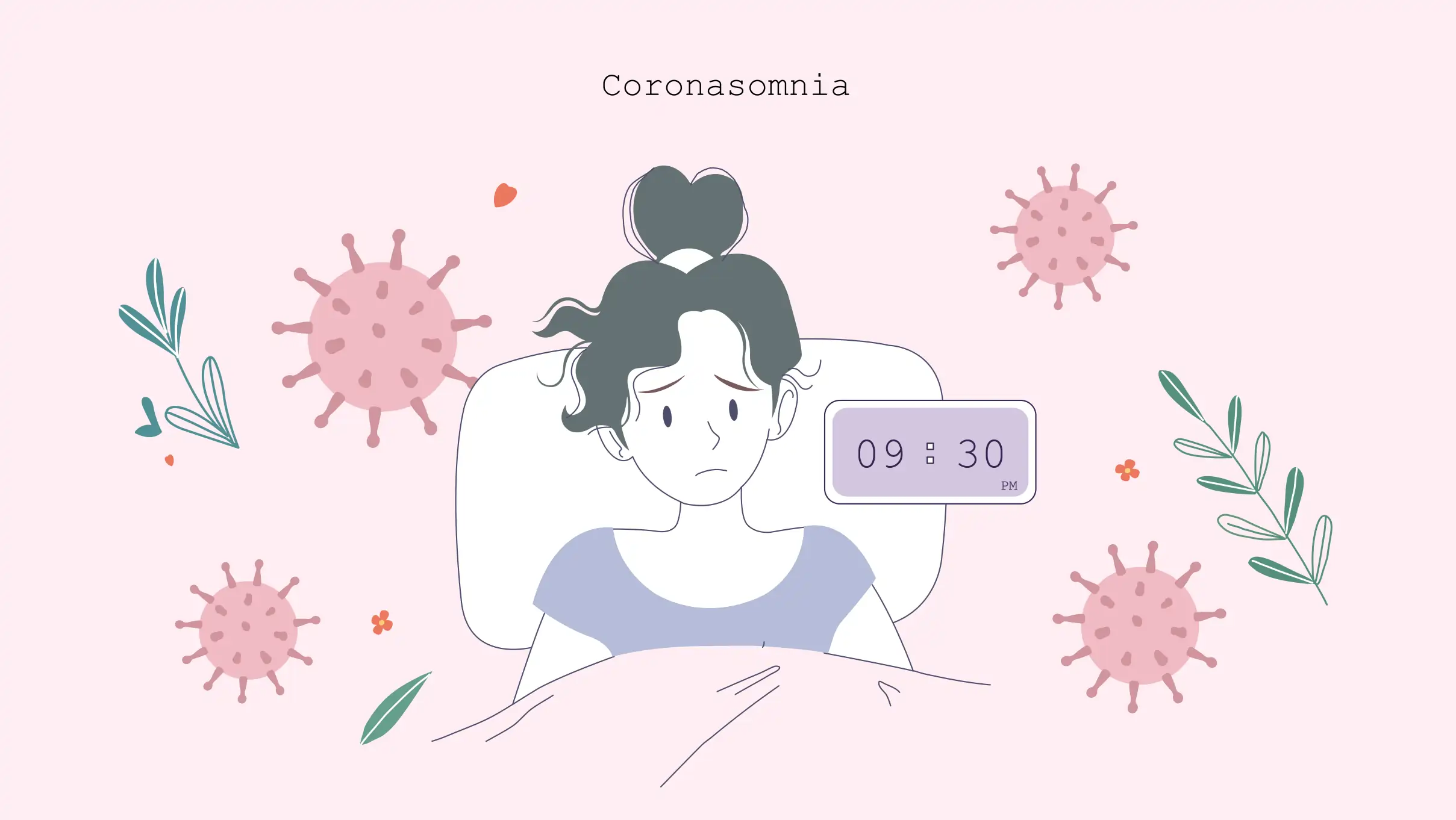Coronasomnia: Definition, Symptoms, and Solutions
Written by


Even today, we are fighting the traces of the pandemic. But coronavirus didn’t come alone, along with it was chronic stress that left lasting effects. And stress has always been a trigger for insomnia, a condition where you have trouble sleeping and staying asleep. The stress and exhaustion that the coronavirus brought with it depriving people of a good night’s rest was labelled as coronasomnia. Today, Sleep Guides India will tell you everything about coronasomnia and the solutions to get rid of it.
What Is Coronasomnia?
When it comes to coronasomnia definition, it can be defined as the sleep problems people are suffering from due to the pandemic. Some of the most common coronasomnia symptoms are anxiety, depression, and stress. Usually stress, depression, and anxiety are triggers for insomnia, but coronasomnia is different.
Why Does Coronasomnia Happen?
As aforementioned, not everyone can deal with the pandemic’s stress. This soon causes sleep issues, and the cycle continues. This stress is primarily because of the uncertainty that still looms over us. When a lockdown is casually discussed, some still feel the anxiety of it. And with lockdowns occurring again in China, people who dealt with this anxiety before may feel it resurfacing. Also, pandemic fatigue can be the reason for the same as working from home is still a norm for several today.
Symptoms of Coronasomnia
For several people, the pandemic was the reason for their coronasomnia, where financial or emotional stress, social distancing, and unpredictability were the reason. But you may still be going through it. If that’s the case, understanding the symptoms can help you out. They are;
- Insomnia
- Too much stress or anxiety
- Severe symptoms of anxiety or depression with intrusive thoughts
- Delayed or no sleep schedule
- Daytime sleepiness, poor focus, and sleep deprivation
Effects of Coronasomnia on Your Health
Just like insomnia, coronasomnia can also cause;
- Troubles with sleep.
- Fatigue and mood swings which may hamper your concentration and focus.
- Adults who don’t experience enough sleep may go through stress, which can hamper their brain’s performance.
- It can also lead to obesity.
- Make you lose interest in sex.
- Insomnia can weaken the immune system, leading to health problems like diabetes and heart disease.
Tips for Better Sleep During COVID-19
Some of the tips on how covid insomnia dealt with are;
Keep a normal daily routine
To combat covid insomnia, you must opt for a normal daily routine. If you work from home, try to maintain the same routine you would do when you work from the office. And take frequent breaks as you would in your workspace. Keep your evenings for yourself and try to do things that bring you joy.
Create and keep a going-to-bed routine
As you start reaching the end of your day, slow down. Some of the things you can include are;
- Dim the lights to enhance the production of melatonin
- Take a warm bath as it cools the core temperature of the body, making it easier to fall asleep
- Try other relaxation techniques, such as meditation or journaling
Avoid screens in the bedroom
Once you go to bed, refrain from checking your phones or other electronics. This is because they emit blue light, which is known to hamper your sleep.
Don’t use your bedroom, and especially your bed, as your office
One of the most essential rules you must set for yourself is to avoid working from your bed. Have a designated spot for work. Otherwise, you will feel the stress of the work even when you are going to sleep. Your bed should be only associated with sleep.
Get some exercise during the day
Get some exercise every day, as it can help you combat your stress levels. If working out in the morning is not your cup of tea, you can do it in the evening. But make sure you do it a few hours before your bedtime.
Don’t take naps
Naps can be great when you make it quick to recharge your batteries and restore your energy. However, long naps or taking one late in the day can disrupt your sleep cycle.
Get some sunlight
As soon as you wake up, getting some sunlight helps keep your circadian rhythm on track.
Don’t eat dinner late
Eating dinner early gives your body time to digest. So, when you go to bed, all the metabolic work is done, making it easier for you to fall asleep.
If you wake up in the middle of the night and can’t sleep, get out of bed
Sometimes, when you wake up at night, it may get difficult for you to fall back to sleep. In such cases, make sure you get out of bed, do a simple task for about half an hour, and then revisit sleeping.
Cut back on the news and social media, especially in the evening
Limit your consumption of news, especially close to bed as it can overstimulate your mind, leaving you anxious and disrupt your sleep.
Go easy on the alcohol and caffeine
While alcohol makes you fall asleep faster, it can cause several sleep disruptions throughout the night. You may wake up to pee, leave you thirsty, and disturb the REM sleep stage. Conversely, caffeine, stays in your system for almost 10 hours.
Be careful with sleep medication
Don’t self-medicate. If you think sleep medication is what you need, speak with your doctor today.
Try learning to meditate with one of the many apps available
Meditation is excellent for good mental health. It can reduce your stress and anxiety, making it easier for you to fall asleep.
Conclusion
Coronasomnia can be dealt with by following the tips mentioned above. However, if it is too much for you and interrupts your daily life, visit a doctor today.
FAQs
What should I do if my child has night terrors?
When your child is having a night terror, ensure you don’t wake them up and visit a doctor for the right treatment.
How do I know if my toddler has night terrors?
During a night terror, your child may look like they are in a panic.
At what age do night terrors start?
Night terrors usually occur between the ages of 4 to 12.
people like this article
Written by



